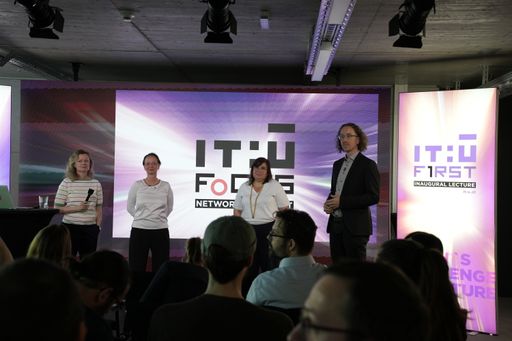The sixth and final inaugural lecture on IT: U took place on Tuesday, April 29, 2025. The “First Lecture” by Sebastian Dennerlein, Assistant Professor of Digital Transformation in Learning, was all about “new university teaching”: How does artificial intelligence learn and work? Christina Nyström, Founding Director of Learning, and Carla Barreiros, Head of Project Based Learning also devoted themselves to the questions: What does interdisciplinary project -based learning at IT: U? And how can intelligent digital tools support teaching and learning?
“Tonight has made it clear: future -oriented education is far more than pure knowledge transfer. It has to be based on interdisciplinary cooperation, enable project -based and competence -oriented learning and use intelligent digital technologies in a targeted manner. Only in this way can people in an increasingly shaped world learn, create work and create innovations – that’s exactly what we want to enable on IT: u”
, So IT: President of the U-foundation Stefanie Lindstaedt.
Technology meets education: Learning in the AI age
IT: U Founding Professor Sebastian Dennerlein teaches and researches in the area of ”Digital Transformation in Learning”: his work is dedicated to technology -based learning in university formation and at work. The focus is on how people work together, learn and innovations in interdisciplinary and interdisciplinary teams. It is about understanding as well as the targeted support of individual and community learning processes with the help of intelligent technologies. Another focus is on the accompaniment of software development teams in the design of ethically responsible AI – because tools such as chatt are increasingly changing how we teach and learn. It is all the more important to integrate AI sensibly and responsibly into educational processes – with the aim of promoting active forms of learning and making them effective on a larger scale.
“Social challenges such as the energy transition can only be dealt with when people work closely together from different disciplines, professions and organizations. In order to successfully accompany such interprofessional change processes, an understanding of how teams learn together- and how these learning processes develop over time. This complex task requires a process-oriented perspective and is particularly good through the cooperation of educational and computer science”
explains Sebastian Dennerlein, Assistant Professor of Digital Transformation in Learning.
Think of education again: project -based and interdisciplinary
Christina Nyström, Founding Director of Learning, and Carla Barreiros, Head of Project Based Learning, showed why IT: U is following the new model of interdisciplinary, project -based teaching. They emphasized that future -oriented education is based on cooperation, be competence -oriented and must be supported by intelligent technologies. This form of collaboration improves both teaching and learning. An example from practice is the development of AI tutors who offer personalized and adaptable learning experiences-supported by Large Language Models (LLM).
“We believe that interdisciplinary, project -oriented learning is of crucial importance because it reflects real challenges of our time. These are complex, unpredictable and not limited to a specific subject or a specific area”
Christina Nyström, Founding Director of Learning.
“Learn students to think comprehensively, to work together effectively and to tackle challenges from different perspectives. This gives the learning deeper meaning and prepares young people to find their way around in a changing world”
berichtet Carla Barreiros, Head of Project Based Learning.
All inaugural lectures to look out: Inaugural Lecture – YouTube
